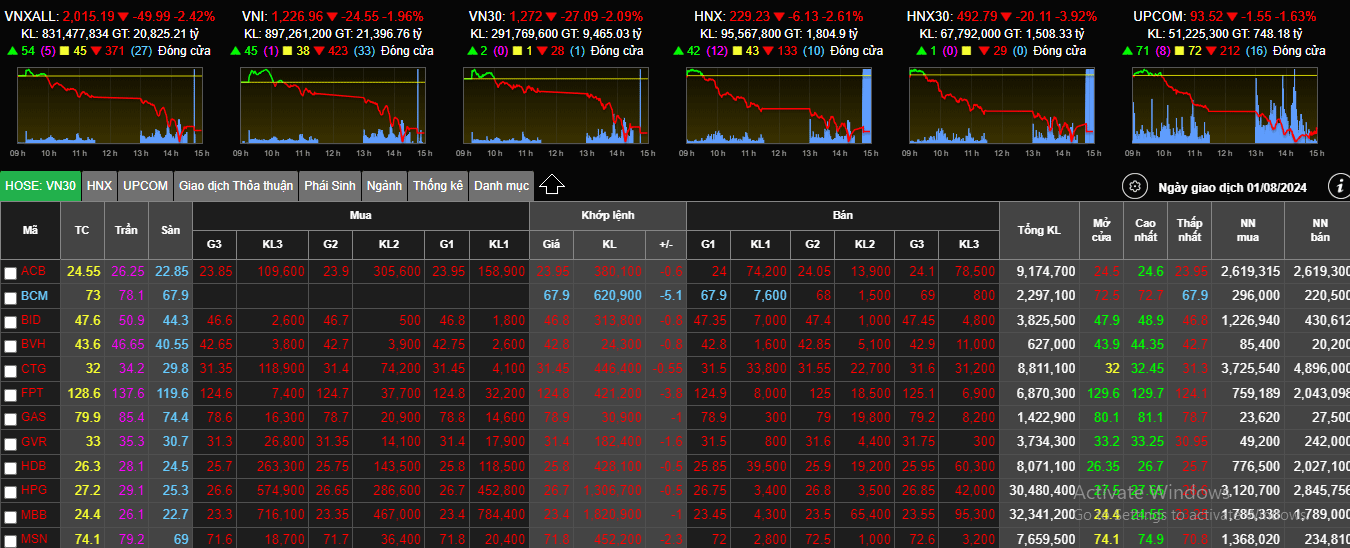The stock market did not record any significant bad news, and expectations for a US interest rate cut in September were even brighter than ever, thereby reducing pressure on the USD/VND exchange rate. However, the disastrously weak demand forced those who wanted to sell stocks to lower their prices, leading to rapid declines in stocks across most sectors.
Banking stocks were a rare bright spot, with the breakthrough of the "big guy" Vietcombank (VCB) not helping the stock market much. The VN-Index fell 22.35 points (-1.8%) to 1,229.16 points at the end of the afternoon regular order matching session.
At the end of the first trading session of August, VN-Index decreased by 24.55 points (-2%), down to 1,226.96.
At the end of the trading session on August 1, among the 30 pillar stocks of the VN30 group, 28 stocks decreased in price, including the Industrial Development and Investment Corporation (BCM) which hit the floor price of 67,900 VND/share.
Real estate, finance, technology, retail stocks,... all fell sharply.
In addition to BCM, the floor price decreased by -7% to 67,900 VND. Following were GVR -4.9% to 31,400 VND, SSI -4.7% to 30,300 VND, MBB -4.1% to 23,000 VND.
The codes VRE, POW, SHB , VIB, VPB, ACB, TPB, MWG, FPT, MSN, STB all extended their downward trend, losing from 2.2% to 3.3%.
Billionaire Pham Nhat Vuong's group of stocks fell sharply in the afternoon session, before easing off at the end of the session. Vinhomes (VHM) fell 250 VND to 36,450 VND/share; Vingroup (VIC) fell 200 VND to 42,100 VND/share. Vincom Retail (VRE) fell 400 VND to 18,200 VND.
Most bank stocks decreased in price, except for the big guy Vietcombank which increased by 1,500 VND to 90,700 VND/share and SeABank (SSB) of female tycoon Nguyen Thi Nga which increased by 150 VND to 21,950 VND/share.
It can be seen that the market is quite complicated, falling sharply with the caution of buyers. The stock market fell despite no sudden bad news, even last night the Fed Chairman Jerome Powell gave a clear signal about reducing interest rates in September.
The highlight of the first trading session of the month was the sudden weakening of demand at the end of the morning session and the first half of the afternoon session. Bottom-fishing demand only increased when the VN-Index plummeted by 25-27 points. However, in general, the buying and selling gap was still quite large. This was the reason why stocks fell across the board.
It is worth mentioning that the decline in liquidity in the stock market in recent sessions has made even the most optimistic people worried. Many people believe that the risk of "getting into stocks" at this time is very high, choosing the right stocks will bring small profits but choosing the wrong ones will lead to big losses.
Therefore, many investors said they waited until the stressful time passed before making a decision, to feel more secure and safe.

In fact, recent economic figures have been quite positive, with a very high trade surplus and strong foreign direct investment (FDI). However, if we look closely, the trade surplus is mainly due to the FDI sector, while the amount of foreign money withdrawn from the stock market since the beginning of the year has been very large.
In fact, foreign investors sold more than 2 billion USD worth of stocks in the first 7 months of the year. Meanwhile, domestic securities companies and organizations showed signs of buying less, being quite cautious with stock investment activities. The group of small investors was also very cautious.
If in the first months of the year, foreign investors selling Vietnamese stocks could withdraw money and convert it to USD to enjoy higher interest rates as well as prevent VND depreciation, now the worry about the risk of USD/VND exchange rate still remains when Vietnam enters a new period of salary increase. Moreover, money flows tend to find their way to the banking channel when deposit interest rates increase.
The prospect of cash flow into the stock market also does not seem bright, as lending margins at securities companies have reached a record high, but liquidity in the market remains low.
Some experts believe that the amount of money lent against securities may be related to transactions in which leading shareholders or major shareholders buy back large blocks of shares, including those sold by some foreign investors.
The banking sector is considered the most active because "when the tide rises, the boat rises", interest rates increase, lending increases. Even before, deposit interest rates were low, but lending interest rates were still high, NIM skyrocketed. However, when businesses encounter difficulties, banks will also be affected. Bad debt may increase again. In addition, banks are also under pressure to lower lending interest rates to meet the requirements of promoting economic growth...
The global decline in the USD may ease the tension in the USD/VND exchange rate, but the concern lies elsewhere.
The Q3/2024 business results are almost all in. Investors may be worried about a period of lack of supporting information and an upcoming “ghost month”. In that context, the market faces the risk of bad news appearing unexpectedly.

Source: https://vietnamnet.vn/co-phieu-do-san-nhom-ong-lon-tru-cot-rot-da-lao-doc-2307699.html







































Comment (0)